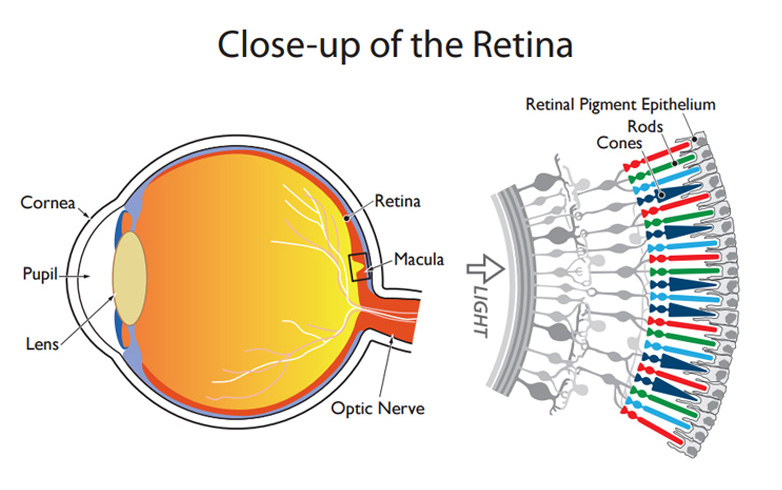What is the retina?
The optics of the eye create an image of the visual world on the retina, which serves much the same function as the film in a camera. The retina is a layer of light-sensitive cells lining the back of your eye. As light rays enter your eye, the retina converts the rays into signals that are sent through the optic nerve to your brain, where they are recognized as images. The macula is the small area at the center of your retina that allows you to see fine details. The macula normally lies flat against the back of the eye, like film lining the back of a camera.
Common retinal problems
Retinal tear: When the vitreous (clear, gel-like fluid in the eye) shrinks and pulls at the thin tissue lining the back of the eye with enough force, it can cause a break or a tear in the retinal tissue. This commonly results in a sudden onset of flashes and floaters.
Retinal detachment: A retinal detachment is usually indicated by a presence of fluid under the retina. Usually this is a result of a retinal tear allowing fluid to pass through it and therefore causing the retina to detach from the underlying tissue layer.
Diabetic retinopathy: Diabetic retinopathy is a diabetic complication that affects the eyes. It’s caused by damage to the blood vessels of the light-sensitive tissue at the back of the eye (retina).
Macular hole: A macular hole is a small break in the macula, located in the center of the eye’s retina. The macula provides the sharp, central vision we need for reading, driving and seeing fine detail.
Epiretinal membrane: An ERM is a delicate tissue-like scar or membrane that forms on top of the retina. When it forms over the macula, it can cause visual distortion and blurring in the central vision.
When should I see an ophthalmologist?
Because the retina is so vital to our eyesight, symptoms related to retinal problems are treated with urgency. Common signs and symptoms of possible retinal problems are:
Seeing flashes or floaters
Blurry or distorted vision
Curtain or shadow in the peripheral (side) vision
Sudden loss of vision
Most of these warrant seeing an ophthalmologist, but particularly if there is an increase in symptoms/severity or if symptoms occur suddenly. Some people will have ongoing floaters in their vision and will not necessarily need anything other than regular observation, so it is best for the patient to familiarize themselves with their eyes and be vigilant when noticing changes.
Read more about retinal problems by clicking on the links below






